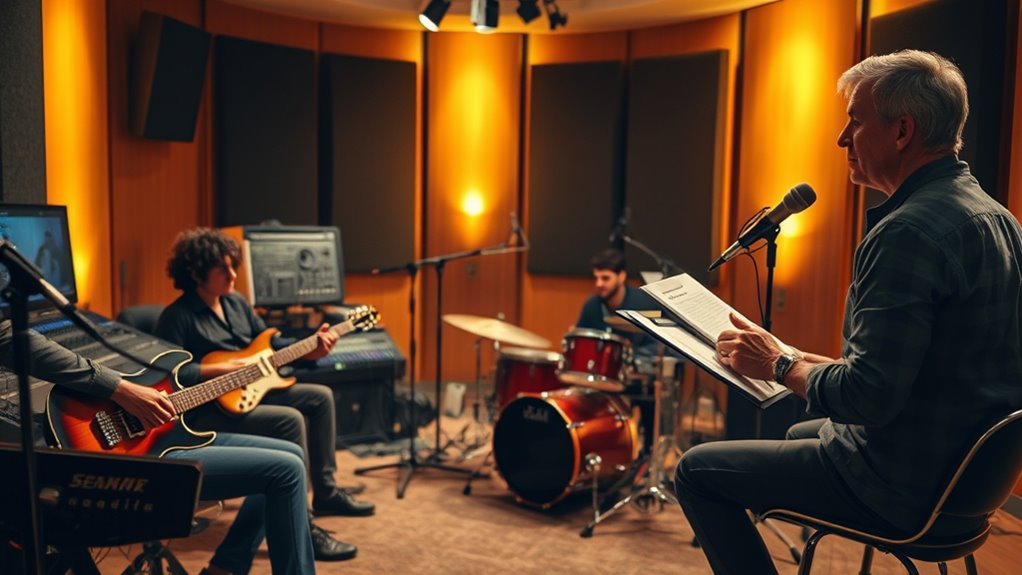To guarantee fair pay, you should understand how royalties from sales, streaming, and licensing are divided and negotiate for a share reflecting your contribution. Don’t accept low upfront fees without securing ongoing royalties or recognition. Be proactive in contract discussions, ask questions about your rights, and push for transparency in royalty splits. If you want to learn how to maximize your earnings and protect your work, there’s more to contemplate beyond the basics.
Key Takeaways
- Negotiate clear contracts that specify royalty splits, payment schedules, and rights before recording begins.
- Educate yourself on industry standard practices and contractual language to ensure fair terms.
- Recognize and assert your right to ongoing royalties from sales, streaming, and licensing.
- Seek legal advice or representation to improve negotiation power and contract fairness.
- Advocate for transparent royalty distribution processes that fairly compensate all contributors.

Session musicians and producers play a crucial role in shaping the sound of your favorite recordings, yet many don’t receive fair compensation for their work. This imbalance often stems from complex issues surrounding royalty distribution and contract negotiations. When you consider how royalties are divided, it’s clear that session players and producers frequently miss out on their fair share. Royalties generated from sales, streaming, synchronization, or licensing are supposed to be split according to predetermined agreements. However, the details of royalty distribution can be opaque or poorly enforced, leading to underpayment. You might find that record labels or publishers hold tight control over royalty pools, leaving session musicians and producers on the sidelines, earning only flat fees rather than ongoing earnings. Additionally, understanding the industry practices related to royalty sharing can help protect your earnings and ensure fair treatment. Contract negotiations are another critical factor affecting fair compensation. Too often, session musicians and producers accept initial offers without fully understanding their value or negotiating better terms. Labels or artists might present contracts that favor their interests, including restrictive clauses, low upfront payments, or limited rights to royalties. If you’re involved in such negotiations, it’s essential to be aware of your worth and to push for clear, transparent agreements. You should seek contracts that specify royalty rates, payment schedules, and rights to future earnings. Negotiating effectively can ensure you don’t just get paid once but continue to benefit from the commercial success of the recordings you contribute to. It’s also important to recognize that many session musicians and producers lack proper legal representation or industry knowledge, which hampers their ability to negotiate favorable terms. Educating yourself about standard contract language and industry practices can give you leverage. For example, understanding how royalty splits work or knowing what clauses to push back on can make a significant difference. Additionally, establishing clear contracts before entering the studio helps prevent disputes later on. You want to make sure your rights are protected and that you’re fairly compensated when your work generates revenue over time. Ultimately, fair compensation hinges on transparency and assertiveness. You have the right to understand how royalties are distributed and to negotiate terms that reflect your contribution. Recognizing the importance of contracts and actively participating in negotiations can help you secure a more equitable share of the profits your work helps generate. By staying informed and proactive, you can ensure that your talents are rewarded fairly, and that your role in shaping memorable recordings isn’t undervalued or overlooked.
Frequently Asked Questions
How Are Session Musicians Typically Paid?
You’re typically paid per session or track, with rates varying based on experience and project scope. During studio etiquette, it’s important to discuss payment upfront, adhering to union regulations if applicable. Many musicians negotiate contracts that specify flat fees or hourly rates, ensuring clear expectations. Always confirm payment terms before recording, and follow professional conduct to maintain good relationships with producers and clients.
What Legal Rights Do Producers Have Over Their Work?
You have legal rights over your work through copyright ownership and contractual rights. This means you can control how your creations are used, reproduced, and distributed, depending on the agreements you sign. As a producer, you should carefully review contracts to understand your rights, such as ownership of recordings and licensing terms. Safeguarding these rights ensures you’re fairly compensated and maintains control over your creative output.
How Are Royalties Split Between Artists and Session Players?
You typically split royalties based on the artist session split agreement, which allocates a percentage of royalty distribution to session players and artists. Usually, artists receive a larger share, but session musicians can negotiate for more, especially if they contribute substantially. The exact split varies, so it’s essential to have clear agreements upfront, ensuring everyone knows how royalties will be divided, protecting your rights and earnings.
What Factors Influence Session Musician Rates?
You influence session musician rates through studio negotiations, where experience, reputation, and skill are key. Equipment costs also play a role, as musicians might charge more if they bring specialized gear or need to rent equipment. Factors like the project’s complexity, recording duration, and whether the session is in a high-cost city further impact rates. Being prepared and clear about your needs helps secure fair compensation.
Are There Standard Contracts for Session Work?
Yes, there are standard contracts for session work. You can find contract templates online or through industry organizations. Many union agreements provide specific language and terms to safeguard both musicians and producers, guaranteeing fair compensation and clear expectations. Using these templates or union agreements helps establish a professional relationship, minimizes misunderstandings, and ensures everyone’s rights are protected throughout the session.
Conclusion
Ensuring fair pay for session musicians and producers isn’t just ethical—it’s essential for a thriving music industry. Did you know that over 70% of session musicians report they struggle with fair compensation? By advocating for equitable wages, you help support their talent and creativity, leading to better music for everyone. When everyone gets paid fairly, the industry grows stronger, more innovative, and more sustainable for years to come.









